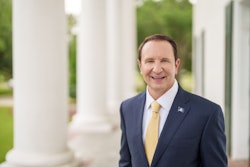
“Essentially, the report said, ‘Department of Education, do your job and provide oversight,’” said Phil Hill, partner and co-founder of MindWires, an education technology consultancy firm. “I’m not sure anyone is saying that they disagree with that. So, you can look at this report and think, there’s not much to it. But I think there are a lot of regulatory changes that people want to push and have been waiting on the GAO report to do. It’s significant, even though the findings didn’t have anything damning.”
OPMs are third-party, for-profit companies that colleges can hire to help run online education programs. These companies provide a range of services, often including recruiting students, according to the GAO report.
To pay OPMs, many colleges opt to share their tuition revenue. OPMs typically get 40% to 60% of every tuition dollar, and some can get up to 80%. These contracts also tend to be lengthy, spanning several years. But when recruiting services are involved, colleges and OPMs fall into a tricky legal territory that requires careful federal oversight—which the GAO found lacking.
“There’s nothing groundbreaking in the GAO report,” said Michelle Dimino, an education senior policy advisor at Third Way, a centrist think tank. “The main takeaway is there are not currently systems in place to actually monitor compliance with the incentive compensation ban.”
That ban refers to the Higher Education Act outlawing incentive compensation for recruiting students as a way to prevent predatory recruiting practices. But a 2011 Dear Colleague letter from ED lets OPMs provide recruiting support through tuition-sharing agreements when such services are “bundled” with other services like curriculum design or marketing.
“So, recruiting alone would not be allowed under a tuition-share, but recruiting plus course design and advising would be under that guidance,” said Dimino. “And so that has allowed OPMs to grow while relying on tuition-sharing as a core part of their business model.”
The GAO report stated that as of July 2021, at least 550 colleges worked with an OPM to support at least 2,900 education programs, or certificate and degree programs. But the report noted that “the exact number of OPM arrangements is unknown, due to a lack of comprehensive data, and there could be more of these OPM arrangements.”
The pandemic has only accelerated the rise of OPMs. GAO found that there were at least 20 new arrangements between colleges and OPMs in 2010. By 2020, that number jumped to at least 165. About 90% of the colleges that contract with OPMs are public or nonprofit colleges.
Yet per the GAO report, colleges and auditors “lack clear instructions from Education, making it hard to detect violations” of that incentive compensation ban.
“The GAO report confirmed a lot of our suspicions, primarily that ED has not been overseeing colleges’ use of OPMs at all up to this point,” said Dr. Stephanie Hall, senior fellow at The Century Foundation, a left-leaning think tank that has been critical of OPM arrangements. “It’s wonderful to see our suspicions confirmed because it means that we can take the next step to get some corrective action taken in protecting students as well as higher education institutions as public goods.”
There also remains no federal requirement for colleges to clearly disclose to prospective or current students that they are working with an OPM. To advocates like Dimino and Hall, students should know if a bulk of their tuition dollars go to an OPM, not the university.
But Trace Urdan, managing director of Tyton Partners, an investment banking and strategy consulting firm that works with the education technology industry, stressed that many of the OPMs have been above board.
“It was a pretty mild finding given how long the team worked on it,” said Urdan of the report, which took over a year to complete. “Listen, if they had found any smoke, we would be reading it.”
The GAO report issued two recommendations to ED, which the department accepted. One asks the Secretary of Education to provide clearer instructions to help auditors “better identify and assess potential incentive compensation ban violations when a college contracts with an OPM.” In particular, the report stated that auditors should have detailed instructions to specifically ask colleges about their OPM contracts.
The GAO report’s second recommendation focused on colleges. It stated that the Secretary of Education should “provide additional instructions to colleges regarding the information they must provide about their OPM arrangements during compliance audits and program reviews.”
The recommendation also said that colleges should get clearer instructions that explain how they are responsible for “both identifying all OPM contracts that include recruiting, and then providing auditors and Education’s program review staff with copies of these contracts and information on how covered OPM staff are compensated.”
Several OPMs released statements agreeing with the GAO report.
“Pearson supports efforts to enhance transparency and ensure quality and accountability in online higher education and we respect the work of the GAO,” said a spokesperson at Pearson, one of the largest OPMs. “We look forward to working with stakeholders and helping inform any policy considerations coming out of the report.”
As for what comes next, Hill said that he will be keeping a close eye on ED in the months to come—and suggests others in higher education do so, too.
“Don’t think the story is over,” said Hill. “The GAO report is like the opening bell. Now you’re going to see the actual changes in oversight and regulation from the federal government. What we don’t know is: are they going to mostly keep the Dear Colleague letter intact and tighten up the definitions? Or there could be big changes to the letter and to revenue-sharing. If you’re a school, things are only just starting. You will need to watch this.”
Rebecca Kelliher can be reached at [email protected].



















